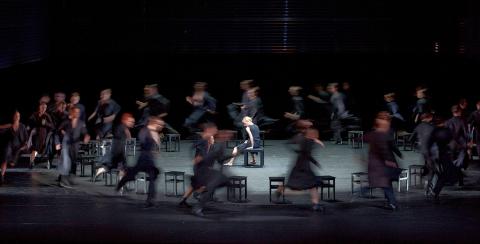The National Kaohsiung Center for the Arts (Weiwuying) opens its portion of the 11th Taiwan International Festival of Arts (TIFA) this weekend with two performances by the Ballett am Rhein Dusseldorf Duisburg, with artistic director Martin Schlapfer’s 7.
The troupe is making its Taiwan debut with the Kaohsiung shows, might be a first-time visitor to the nation, but it is very familiar with Weiwuying’s artistic director, Chien Wen-pin (簡文彬), who moved to Dusseldorf, Germany, in 1996 to become a conductor at the Deutsche Oper am Rhein, which is also home to the ballet company.
Tanz, Europe’s premier dance magazine, named Schlapfer its “Choreographer of the Year” in 2010, just a year after he took over the revived Ballett am Rhein, and has named the troupe “Company of the Year” four times, from 2013 to 2017.

Photo courtesy of the National Kaohsiung Center for the Arts
The company’s appearances in Taiwan will be special because it will be accompanied by the Taipei Symphony Orchestra (台北市立交響樂團), which will be conducted by Chien.
Ballet performances in Taiwan that feature live music are a rarity: Taiwanese choreographer Allen Yu (余能盛) made a point to have an orchestra for his productions for the Chamber Ballet Taipei — later the Formosa Ballet (福爾摩沙芭蕾舞團). Visiting troupes such as the Kirov Ballet sometimes bring their own, but otherwise dancers usually perform to recordings.
Chien began working with Schlapfer and the ballet company in 2012 and the two men collaborated from the beginning on 7, which premiered in October 2013 and is set to Gustav Mahler’s Symphony No. 7.
In an interview posted on Weiwuying’s Web site, Chien said he is eager for Taiwanese audiences to see how Schlapfer connects Mahler’s piece with modern social issues.
Chien ranks the Swiss-born Schlapfer as one the of two choreographers he knows who have the best ears for music; the other is Cloud Gate Dance Theatre (雲門舞集) artistic director Lin Hwai-min (林懷民).
“When they hear music, they can instantly grasp the context and development of the melody, and even predict the next note,” he said.
Mahler’s works are popular among conductors because they “have a clear sense of what the conductor should do,” he said.
Symphony No. 7 is not as well-known as Mahler’s other works, and has been sometimes called his “problem child,” with its awkward first movement, but Schlapfer used that difficult opening to create a whirlwind of activity, filled with dancers in dark costumes and a variety of footwear (or none), before segueing into calmer waters and combinations of pairs and groups, a romantic pas de deux and pointe work.
He has been quoted as saying that “the more I listen to the ‘7,’ the crazier it gets. Mahler’s music releases things in my own choreography which I did not believe I had in me.”
The ballet runs 80 minutes, with no intermission. Following his weekend’s shows in Kaohsiung, the company and orchestra will give two performances at the Grand Theater in the National Taichung Theater to open its TIFA program.

On April 26, The Lancet published a letter from two doctors at Taichung-based China Medical University Hospital (CMUH) warning that “Taiwan’s Health Care System is on the Brink of Collapse.” The authors said that “Years of policy inaction and mismanagement of resources have led to the National Health Insurance system operating under unsustainable conditions.” The pushback was immediate. Errors in the paper were quickly identified and publicized, to discredit the authors (the hospital apologized). CNA reported that CMUH said the letter described Taiwan in 2021 as having 62 nurses per 10,000 people, when the correct number was 78 nurses per 10,000

As we live longer, our risk of cognitive impairment is increasing. How can we delay the onset of symptoms? Do we have to give up every indulgence or can small changes make a difference? We asked neurologists for tips on how to keep our brains healthy for life. TAKE CARE OF YOUR HEALTH “All of the sensible things that apply to bodily health apply to brain health,” says Suzanne O’Sullivan, a consultant in neurology at the National Hospital for Neurology and Neurosurgery in London, and the author of The Age of Diagnosis. “When you’re 20, you can get away with absolute

May 5 to May 11 What started out as friction between Taiwanese students at Taichung First High School and a Japanese head cook escalated dramatically over the first two weeks of May 1927. It began on April 30 when the cook’s wife knew that lotus starch used in that night’s dinner had rat feces in it, but failed to inform staff until the meal was already prepared. The students believed that her silence was intentional, and filed a complaint. The school’s Japanese administrators sided with the cook’s family, dismissing the students as troublemakers and clamping down on their freedoms — with

As Donald Trump’s executive order in March led to the shuttering of Voice of America (VOA) — the global broadcaster whose roots date back to the fight against Nazi propaganda — he quickly attracted support from figures not used to aligning themselves with any US administration. Trump had ordered the US Agency for Global Media, the federal agency that funds VOA and other groups promoting independent journalism overseas, to be “eliminated to the maximum extent consistent with applicable law.” The decision suddenly halted programming in 49 languages to more than 425 million people. In Moscow, Margarita Simonyan, the hardline editor-in-chief of the